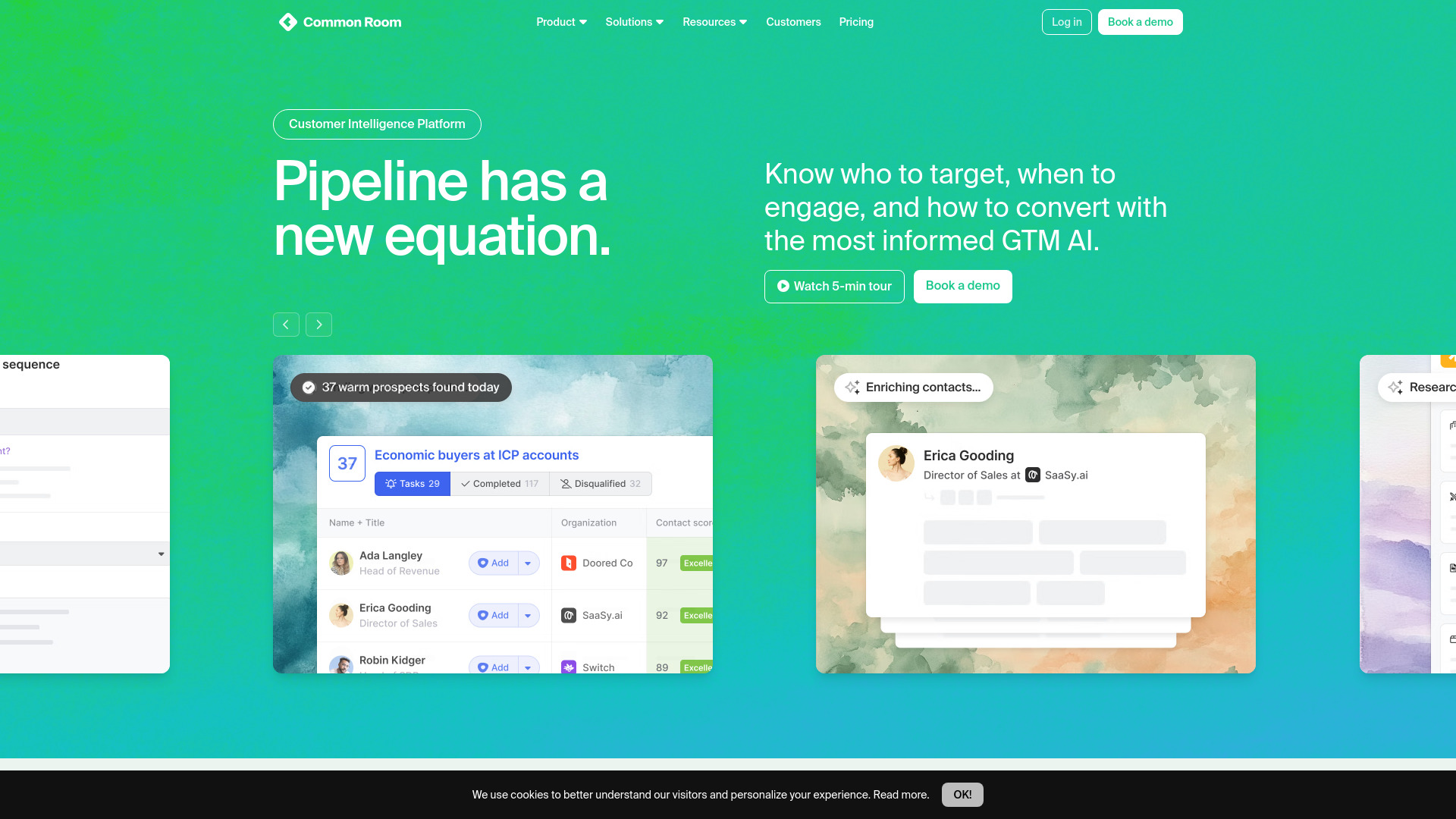- Home
- AI Lead Generation
- Common Room

Common Room
Open Website-
Tool Introduction:AI customer intelligence: unify signals, rank prospects, boost conversion.
-
Inclusion Date:Nov 05, 2025
-
Social Media & Email:
Tool Information
What is Common Room AI
Common Room AI is a customer intelligence platform for GTM teams that turns buying signals into revenue. It aggregates signals from 50+ sources—product usage, website, community, social, CRM, and support—then resolves identities to enrich person and account profiles. With AI-powered activation agents, it prioritizes prospects, automates pipeline plays, and coordinates outreach across channels. The result is faster prospecting, higher outbound conversion, and a shared view of intent across sales, marketing, and customer success.
Main Features of Common Room AI
- Multi-source signal capture: Ingests intent and engagement signals from 50+ sources, including product analytics, web, community, social, CRM, and support tools.
- Identity resolution & enrichment: Unifies person and account records, enriches with firmographics and roles, and eliminates duplicates for a clean GTM graph.
- Intent scoring & prioritization: Scores accounts and leads based on behavior to surface high-intent prospects and accelerate qualification.
- AI activation agents: Automates pipeline plays, nudges, and outreach tasks with configurable rules and human-in-the-loop controls.
- Segment builder: Creates dynamic audiences by ICP, product usage, engagement level, and buying stage for targeted campaigns.
- ABM and PLG support: Aligns account-based motions with product-led growth by combining account signals and user-level activity.
- Native integrations: Syncs with CRM and MAP systems, data warehouses, and messaging tools to activate insights where teams work.
- Analytics & governance: Tracks conversion lift, play performance, and ensures access controls and data hygiene.
Who Can Use Common Room AI
Common Room AI is built for GTM organizations. Sales development and AEs use it to prioritize outreach and book meetings. Demand generation and growth marketers run intent-based campaigns and nurture sequences. RevOps and SalesOps orchestrate routing, scoring, and reporting. Community and product-led growth teams identify high-fit users, while customer success and account managers spot expansion and churn-risk signals.
How to Use Common Room AI
- Connect data sources such as product analytics, website, CRM, marketing automation, community, and support platforms.
- Enable identity resolution to unify people and accounts, then enrich records to complete profiles.
- Define ICP criteria, buying signals, and thresholds for intent scoring and qualification.
- Build segments for ABM, PLG, upsell, or re-engagement using behavioral and firmographic filters.
- Configure AI activation agents and playbooks to automate outreach, tasks, and handoffs across channels.
- Sync prioritized leads and accounts to CRM/MAP, trigger sequences, and route to the right owners.
- Monitor analytics, measure conversion impact, and iterate on scoring models and plays.
Common Room AI Use Cases
B2B SaaS teams accelerate pipeline by combining product usage and website intent to prioritize outbound. ABM programs focus account lists using executive engagement and buying-stage signals. PLG motions identify self-serve users ready for sales assist. Customer success flags expansion opportunities and churn risk from support and community activity. Event and webinar teams capture attendee signals to auto-enroll follow-ups and measure conversion.
Common Room AI Pricing
Common Room AI typically follows a subscription model with tiered plans that scale by features, seats, and data volumes. Enterprise packages are commonly offered via custom quotes and annual agreements. Trials or pilots may be available upon request. For current packaging and pricing details, contact the vendor’s sales team.
Pros and Cons of Common Room AI
Pros:
- Unifies cross-channel signals into a single, actionable customer view.
- Improves outbound conversion through intent scoring and personalization.
- Reduces manual research with AI-driven activation agents and automation.
- Supports both ABM and PLG strategies with flexible segmentation.
- Deep integrations that activate insights in CRM, MAP, and team workflows.
- Clear analytics to attribute pipeline impact and refine plays.
Cons:
- Initial setup requires data connections, mapping, and governance.
- AI-led outreach needs oversight to maintain brand voice and compliance.
- Results depend on data quality and coverage across sources.
- Advanced features and higher data volumes may increase cost for small teams.
- Learning curve for complex scoring models and multi-step playbooks.
FAQs about Common Room AI
-
What data sources does Common Room AI connect to?
It integrates with popular product analytics, CRM, marketing automation, community, social, support, and data warehouse tools to capture signals and activate workflows.
-
How do AI activation agents work?
They use rules and intent scores to trigger outreach, tasks, and routing, coordinating messages across channels with human review where needed.
-
Does it support ABM and PLG?
Yes. It combines account-level intent with user activity to power account-based campaigns and product-led sales assist.
-
Can it replace my CRM?
No. It complements your CRM by enriching records, prioritizing work, and automating plays, then syncing outcomes back to your system of record.


